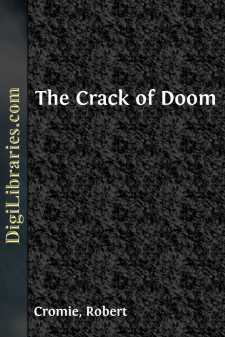Categories
- Antiques & Collectibles 13
- Architecture 36
- Art 48
- Bibles 22
- Biography & Autobiography 813
- Body, Mind & Spirit 142
- Business & Economics 28
- Children's Books 14
- Children's Fiction 11
- Computers 4
- Cooking 94
- Crafts & Hobbies 4
- Drama 346
- Education 46
- Family & Relationships 57
- Fiction 11829
- Games 19
- Gardening 17
- Health & Fitness 34
- History 1377
- House & Home 1
- Humor 147
- Juvenile Fiction 1873
- Juvenile Nonfiction 202
- Language Arts & Disciplines 88
- Law 16
- Literary Collections 686
- Literary Criticism 179
- Mathematics 13
- Medical 41
- Music 40
- Nature 179
- Non-Classifiable 1768
- Performing Arts 7
- Periodicals 1453
- Philosophy 64
- Photography 2
- Poetry 896
- Political Science 203
- Psychology 42
- Reference 154
- Religion 513
- Science 126
- Self-Help 84
- Social Science 81
- Sports & Recreation 34
- Study Aids 3
- Technology & Engineering 59
- Transportation 23
- Travel 463
- True Crime 29
The Crack of Doom
by: Robert Cromie
Categories:
Description:
Excerpt
CHAPTER I.
"The Universe is a mistake!"
Thus spake Herbert Brande, a passenger on the Majestic, making for Queenstown Harbour, one evening early in the past year. Foolish as the words may seem, they were partly influential in leading to my terrible association with him, and all that is described in this book.
Brande was standing beside me on the starboard side of the vessel. We had been discussing a current astronomical essay, as we watched the hazy blue line of the Irish coast rise on the horizon. This conversation was interrupted by Brande, who said, impatiently:
"Why tell us of stars distant so far from this insignificant little world of ours—so insignificant that even its own inhabitants speak disrespectfully of it—that it would take hundreds of years to telegraph to some of them, thousands to others, and millions to the rest? Why limit oneself to a mere million of years for a dramatic illustration, when there is a star in space distant so far from us that if a telegram left the earth for it this very night, and maintained for ever its initial velocity, it would never reach that star?"
He said this without any apparent effort after rhetorical effect; but the suddenness with which he had presented a very obvious truism in a fresh light to me made the conception of the vastness of space absolutely oppressive. In the hope of changing the subject I replied:
"Nothing is gained by dwelling on these scientific speculations. The mind is only bewildered. The Universe is inexplicable."
"The Universe!" he exclaimed. "That is easily explained. The Universe is a mistake!"
"The greatest mistake of the century, I suppose," I added, somewhat annoyed, for I thought Brande was laughing at me.
"Say, of Time, and I agree with you," he replied, careless of my astonishment.
I did not answer him for some moments.
This man Brande was young in years, but middle-aged in the expression of his pale, intellectual face, and old—if age be synonymous with knowledge—in his ideas. His knowledge, indeed, was so exhaustive that the scientific pleasantries to which he was prone could always be justified, dialectically at least, by him when he was contradicted. Those who knew him well did not argue with him. I was always stumbling into intellectual pitfalls, for I had only known him since the steamer left New York.
As to myself, there is little to be told. My history prior to my acquaintance with Brande was commonplace. I was merely an active, athletic Englishman, Arthur Marcel by name. I had studied medicine, and was a doctor in all but the degree. This certificate had been dispensed with owing to an unexpected legacy, on receipt of which I determined to devote it to the furtherance of my own amusement. In the pursuit of this object, I had visited many lands and had become familiar with most of the beaten tracks of travel. I was returning to England after an absence of three years spent in aimless roaming. My age was thirty-one years, and my salient characteristic at the time was to hold fast by anything that interested me, until my humour changed....


